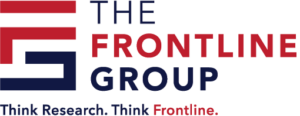
OUR INNOVATIVE PRODUCTS
The Frontline Group has conducted extensive research in Southern Africa, Africa and globally. The company’s exponential growth is matched with our ongoing technological innovation for efficient and effective research methods. These technological innovations are part of our insertion into the 4th Industrial Revolution and therefore fit for a 21st-century company.
The Frontline Group’s technological innovations are guided by the company’s culture, which includes a solid commitment to engaging and developing young people. Furthermore, the company has an open policy for testing ideas that have the potential to create growth opportunities.
Our innovative products, -which we collectively refer to as Computer Assisted Research Methodologies (CARM) include The Frontline Risk Barometer (FRB), and Web application Business Leaders Confidence Index, Computer Assisted Telephonic Interviews (CATI), Computer Assisted Web Interviews (CAWI), and Computer-Assisted Paper Interviews (CAPI). We are also in the process of developing an application for conducting qualitative interviews online, which is The Frontline Qualitative Research Application (QRA).
COMPUTER-ASSISTED RESEARCH METHODOLOGY
ABOUT COMPUTER-ASSISTED RESEARCH METHODOLOGY
As information is needed, disseminated, and consumed at an ever-increasing pace, we found that our clients increasingly require reliable data much faster than what the conventional data collection methods are able to deliver. This demand for technology has further been acerbated by Covid-19, which has limited face to face interactions. These factors add to the turn to the 4th Industrial Revolution, by which technological innovations are becoming a way of life. It follows that the growth of any business is tethered around adapting traditional methods to the current global moment of technological change. The Frontline Group is clear on its commitment and flexibility to ensure that we remain on the frontline of providing value to our clients, and therefore, helping them find solutions to their needs faster and efficiently.
THE VALUE OF COMPUTER ASSISTED RESEARCH METHODOLOGY
Traditional research encompasses data collection, capturing, processing, cleaning, and analysis. Traditionally, field workers carry out data collection manually. This takes time and requires rigorous management for purposes of quality. With CARM, data collection and storage tasks are completed in real-time with limited human effort, allowing the end-user to view research results in different visualisations at any point during or after the study.
The use of CARM solves another challenge, namely, quality assurance and ethics. Frontline’s system allows for real-life monitoring and supervision of all data collection regardless of where and when data is being collected. This decreases the possibility of false information, unethical and erroneous data.
In terms of storage, all questionnaires and data are safely stored on our cloud-based system and thus cannot be lost, damaged, or tampered with – assuring the safety of our clients’ data. The very core of our system is quality, ease of use and quick delivery.
OUR SPECIFIC CARM PRODUCTS
Frontline’s CARM is a summation of three technologies used to collect, process, analyse, disseminate and store real-time data. These products are detailed below


The CATI system makes use of telephonic interviews to gather data from respondents. The Frontline Group owns a CATI centre, through which we collect data for most of our studies. Using this method, we have recently completed studies of over 3000 sample sizes without physically interacting with participants’, ensuring the safety and credibility of our client’s data. The CATI system enables us to reduce the time required by traditional methods. The CATI system also employs lesser human resources, and therefore minimising human error in data collection.
Regarding how CATI works, the interviewer calls the research participant’s number displayed on their Personal Computer (PC) screen. If the participant consents to participate in the survey, the interviewer starts reading the questions displayed on the PC screen; after that, the interviewer selects answers provided by the participant. The CATI software automatically proceeds to the next question after the selection, following a configured or programmed logical path.
Once the questionnaire is completed, the system will automatically display a new respondent to call. The system will then manage contacts according to the configuration set by the administrators. For example, contacts with a busy line will be displayed again after 15 minutes, prioritising appointments over uncontacted respondents. Suppose a participant answers a call from an interviewer when the participant is actually not available at that moment for the interview. Then, in that case, the interviewer schedules an appointment that the software will automatically display at the scheduled date and time. This reduces the sample’s attrition rate.
How calls are made: each interviewer needs a standard phone or a softphone. In both cases, the interviewer can call research participants by clicking on the number displayed on the screen. If the line is busy or cannot be reached, the software allows the interviewer to indicate the call’s outcome either as “voicemail” or “busy line”. After the indication, the software will automatically display a new contact.


The Computer-Assisted Web Interviews (CAWI) distributes web-based surveys that are linked to our central system. Links to questionnaires are sent to respondents via email or SMS and can be opened, started, paused, and completed at the respondent’s pace. Our CAWI methodology is suitable for high-profile or busy respondents who may not have the time to complete a questionnaire in one sitting nor avail themselves for a telephonic or in-person interview. The data collected is automatically saved on our central system and analysed in real-time.
The benefit of CAWI is that one questionnaire is sent to multiple respondents, who can then complete it simultaneously without an interviewer. Alternatively, custom links to individualised questionnaires can be sent to respective respondents, meaning that only that particular respondent can access that survey using their credentials.


We understand that not all clients are looking for a completely digital data collection experience and still prefer to have the “human element” in their research methods. In response to that, we adopted the Computer Assisted Paper Interviews (CAPI) methodology, which is simply a face-to-face data collection exercise, except that rather than paper questionnaires, researchers use mobile devices on which the questionnaires are stored and completed. CAPI ensures our vision for innovative, fast, and reliable data while keeping the client’s need for human interaction.
All three technologies are linked to a central system that enables real-time data processing and analyses. Additionally, data is exported in Excel, SPSS, CSV, and various other formats at the client’s request.
THE FRONTLINE RISK BAROMETER
The Frontline Group has developed a ground-breaking tool for research, a web-based application that measures social risks, particularly for our clients whose business is influenced by social risks. The application, known as the Frontline Risk Barometer (FRB), aims to detect the risks faced by social groups on the frontline of conflicts. More specifically, the application was first developed to capture and synthesise the perspectives and sentiments of mining communities towards mining companies. The use of this tool has evolved to include perspectives and sentiments of other groups on conflict frontlines such as immigrants, victims of gender-based abuse, and victims of crimes. Our clients are corporates, NGOs, government, and individuals interested in gathering data that might help prevent, manage, or contain various kinds of conflicts, including but not limited to xenophobia and community protests.
The Frontline Risk Barometer is an innovative technology that seeks to provide strategic options to conflict responses, contrary to traditional methods that are by and large reactive, and therefore less effective.
The FRB employs media monitoring and natural language processing to track and analyse stories, conversations, and information, ultimately generating real-time visual representations of public perspectives and/or sentiment(s) using predetermined algorithms and real-time data analyses. The FRB tracks complaints, feedback, and general sentiments towards our clients or events. Our barometer tracks the conversations and information on a software platform and looks for set keywords and recurring trends. The data is analysed and presented in a simplified and easy-to-understand visualisation. Given Frontline’s web-based and mobile application architecture, information is easily accessible to the client at any time.
BUSINESS LEADERS CONFIDENCE INDEX (SOUTH AFRICA)
Administered to more than 800 CEOs across South Africa, the BLCI is a CAWI-based Survey that tracks the business sector’s performance across South Africa. The quarterly survey also includes perspectives of South African CEOs on the economy’s overall performance. The data is then computed into an index and disseminated to business leaders, government, and the public at large.
The data is available at a price, on request.
